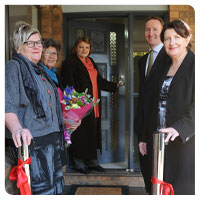 Permanently PJ-clad Jen Cramond, Community Fundraising Manager in our National Office in Sydney, has attracted plenty of attention this month – and a story on the front page of today’s mX newspaper will ensure more people see her in her bright jammies.
Permanently PJ-clad Jen Cramond, Community Fundraising Manager in our National Office in Sydney, has attracted plenty of attention this month – and a story on the front page of today’s mX newspaper will ensure more people see her in her bright jammies.As Jen explained to mX journalist Cathy Morris, she’s been wearing pyjamas on her daily commute from Bondi to the city since the start of the month to help raise money for homelessness. And that includes when she pops out for a coffee or goes out for dinner and drinks at night.
"Generally, people give me an up and down look, and don't say anything," Jen told mX. 'But I have had a couple of people ask me what I'm doing.
"I felt a bit nervous on the first clay, after that I kind of go with the flow. It feels like my normal work attire, but I am looking forward to getting back into my normal work clothes."
Jen said she was motivated by the fact the money was going to a good cause.
"I think it's a small discomfort to raise money for such a good cause, there's lots of people out there who don't get a choice about where they sleep each night."
About 100,000 people were homeless across the country every day, with half of those aged under 25.
For every $100 Jen raises she's wearing PJs for another day this month. She has currently raised $1,400 and her last day is set to be Thursday.
"But if I receive more donations I'll keep going," Jen said, adding that she’s been wearing a variety of different types of PJs as part of her fundraising effort, but "the ones that are matching get the best reaction from people".
Great work, Jen! To show your support for Jen’s efforts and help homeless Australians visit everydayhero.com.au/jen_cramond_pj
You can also follow Jen on Twitter - @everynothingyen

















